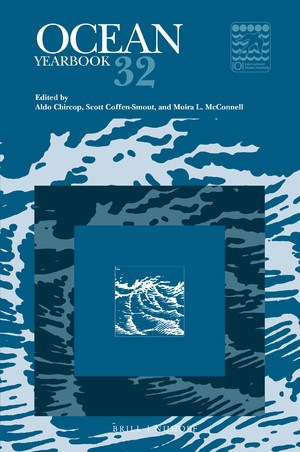Home / Books & Journal Articles / Book Chapter / Archipelagic Regime in the South China Sea: A Debate on the Rights of Continental States’ Outlying Archipelagos


Executive Director & Senior Fellow
Dr. Hong is the author of a chapter for the newly released Oceans Yearbook 32. Her chapter, The Applicability of the Archipelago Regime in the South China Sea: A Debate on the Rights of Continental States’ Outlying Archipelagos provides a Chinese perspective on how to best interpret UNCLOS in regards to the rights of continental states.
The interpretation and applicability of the islands regime under the United Nations Convention on the Law of the Sea (UNCLOS) has always been a question for debate.[1] This is proved again in the South China Sea Arbitration Case between the Philippines and China. An associated question is how much weight an island may be given in maritime delimitation. It is an utmost challenge, if not impossible, to define the legal status of each individual insular feature in the South China Sea and to evaluate the effect of them on maritime delimitation. Applying the concept of the archipelagic regime to the archipelagos in the South China Sea may provide an alternative breakthrough. However, this will raise the question of whether a continental State’s outlying archipelagos enjoy the status of the archipelagic regime as defined in Part IV of UNCLOS.
This article traces the drafting history of the regime of the archipelagic State defined in UNCLOS, and analyzes the legal implication on the concept of archipelagic baselines, the legal status of archipelagic waters, the right of innocent passage, and the right of archipelagic sea lanes passage. It further examines the practice of continental States in their dependent archipelagos and identifies potential developments with respect to the endorsement of the archipelagic concept in the law of the sea.
In the South China Sea Arbitration Case, the Tribunal rules out the possibility of treating the geologically defined archipelago of Nansha Qundao (Spratly Islands) as a single unit that China seems to claim as having the status of an archipelagic regime. China argues that under its administration, the four archipelagos have been a single unit and should enjoy the status of an archipelagic regime. This article argues in favor of the applicability of the archipelagic regime in the Nansha archipelago for the following reasons. First, it meets the criteria for a political, security, and economic entity with interconnectedness. Second, the historic criterion for the identification of the legal archipelago is provided as an alternative in the case that an archipelago cannot meet the other requirement. The four island groups in the South China Sea have been governed as a single entity throughout China’s administrations. Third, there is an emerging customary rule relating to the application of straight baselines to continental States’ outlying archipelagos. Fourth, one of the key elements of an archipelagic regime is the principle of balancing exclusive and inclusive interests of archipelagos (exercise of sovereignty) vis-à-vis those of third States (navigation, traditional fishing rights, etc.). Applying the legal concept of an archipelagic regime to Nansha will serve to guarantee this important principle of balance.
Editors: Aldo Chircop, Scott Coffen-Smout and Moira L. McConnell
Devoted to assessing the state of ocean and coastal governance, knowledge, and management, the Ocean Yearbook provides information in one convenient resource.
As in previous editions, articles provide multidisciplinary expert perspectives on contemporary issues. Each new volume draws on policy studies, international relations, international and comparative law, management, marine sciences, economics, and social sciences. Each volume contains key recent legal and policy instruments.
The Yearbook is a collaborative initiative of the International Ocean Institute ( www.ioinst.org) in Malta and the Marine & Environmental Law Institute ( www.dal.ca/law/MELAW) at the Schulich School of Law, Dalhousie University, Halifax, Canada.
The Yearbook is now available online. Learn more about the electronic product here.
Publication Date: 7 June 2018
ISBN: 978-90-04-36700-5

Executive Director & Senior Fellow
Dr. Nong Hong holds a PhD of interdisciplinary study of international law and international relations from the University of Alberta, Canada and held a Postdoctoral Fellowship in the University’s China Institute. She was ITLOS-Nippon Fellow for International Dispute Settlement (2008-2009), and Visiting Fellow at Australian National Centre for Ocean Resources and Security (2019), the Center of Oceans Law and Policy, University of Virginia (2009) and at the Max Planck Institute for Comparative Public Law and International Law (2007). She is concurrently a research fellow with China Institute, University of Alberta, Canada, and the National Institute for South China Sea Studies, China. Her research takes an interdisciplinary approach to examining international relations and international law, with focus on International Relations and Comparative Politics in general; ocean governance in East Asia and the Arctic; law of the sea; international security, particularly non-traditional security; and international dispute settlement and conflict resolution.

The Institute for China-America Studies is an independent nonprofit, nonpartisan research organization dedicated to strengthening the understanding of U.S.-China relations through expert analysis and practical policy solutions.
1919 M St. NW Suite 310,
Washington, DC 20036
icas@chinaus-icas.org
(202) 968-0595
© 2025 INSTITUTE FOR CHINA-AMERICA STUDIES. ALL RIGHTS RESERVED.
US, China and EU: The race for Greenland’s mineral riches